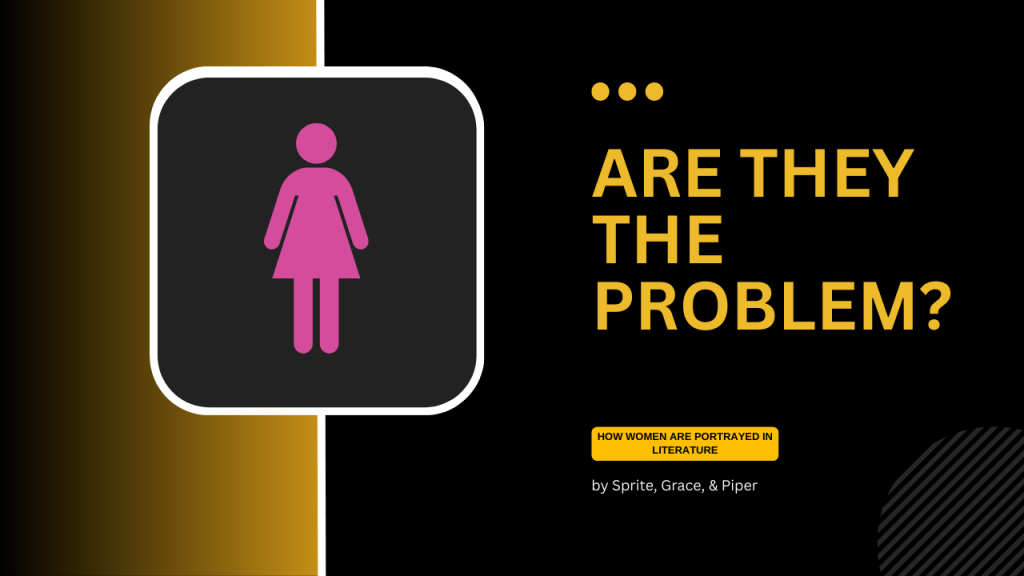Are They The Problem?

Are They The Problem?
How Women Are Portrayed In Literature
Welcome back to Proper Dyktation with Sprite, Piper, and Grace. This episode is called Are They The Problem?. Here, we’ll talk about how women are portrayed in literature.
Intro to Topic [how women are portrayed in literature]
- Background information
- The way women have been written in literature is very reflective of how they were perceived throughout history.
- They are mostly portrayed as wives and mothers.
- Also as weak and feeble individuals that submit to the situations around them.
- They are expected to be passive, gentle and caring, and most often valued for how they looked, not what they did.
- Female characters had to accept authority without any choice of freedom and independence.
- Parameters of the episode
- As we said, we’re going to be talking about women’s portrayal in literature, more specifically, in; A Streetcar Named Desire, Kite Runner, and Fences.
Segment 1: Examples in A Streetcar Named Desire
- Blanche
- Very unstable
- Easily and strongly emotionally attached
- Desperate
- Poor People pleasure
- Anxious and paranoid
- Manipulative
- Arrogant
- Insecure
- Hopeless
- Loud
- Damaged
- Villanized
- Blanche is portrayed as a character with a lot of issues, but rather than sympothized for she is blatently torn apart with accusations of lying, discretion, and adultery, which she happens to be guilty of. Blanche has always been an insecure girl, too preoccupied by her looks to have a care for how she received what she had. She was always a people pleasure who tried to hide her age. was messed up after her husband shot himself because he was gay, right after Blanche found out the truth and exclaimed she hated him. Following her husbands death, she was surrounded by death of her family until she was left alone with rich estates assets and inheritance. Having no knowledge of how to properly maintain this lifestyle and being unemployed, she had lost all property due to mortgage. Upon her arrival she was hysterical and eager to see and tell her sister of all whats happened, as she never returned to Belle Reve after her fathers passing. Stanley is suspicious of her off the initial introduction, and unfolds this hidden information over time, by searching through her belongings and questioning her insecure personality consistantly. He was only trying to protect stella, right?
- Stella
- Victim of abuse
- Covers up messes instead of cleaning them
- Abandoned her hometown after parents death and inheritance
- Settled for below her margin with Stanley
- Savior complex
- Easily manipulated
- More quiet
- She only wants to save herself but doesn’t know how
- Like her sister, she only cares about how she is portrayed. Unlike Blanche’s desire for appearance, she strives for a “better” lifestyle regardless of what it looks like inside.
- Trapped due to her pregnancy
- Like her sister, she uses delusion as a coping mechanism when faced with the truth that she cannot admit to. She believes she left a worse environment to a better one. Though that can’t be told for sure, it seems as though she grew sick of having the responsibility of maintaining a lavish lifestyle, and left her sister, who would’ve seemed like the perfect fit at the time, to take after every asset she inherited. Stella, having dependent behavior as well became reliant on stanley, who was the first male role to enter her life after her fathers death. She married him for the sake of feelings at the time, and that turned into a much darker picture once her marriage started and pregnancy began. Stella hinted at this as she told Blanche he broke all the lightbulbs in their apartment their wedding night, and is called an animal throughout the book. Stanley worked as an army engineer in WWII serving as a master sergeant, prior to his position as a factory parts salesman.
- Eunice
- Eunice isn’t portrayed enough in the book, but my analysis is that she suffers from the same lifestyle Stella has entered with Stanley.
In a streetcar named desire,….
Segment 2: Examples in Kite Runner
- Depiction and treatment of women in…
- Afghanistan
- Since the takeover of Afghanistan by the Taliban in August 2021, women have been wholly excluded from public office and the judiciary. Today, Afghanistan’s women and girls are required to adhere to a strict dress code and are not permitted to travel more than 75 km without a mahram. They are compelled to stay at home.
- Prior to the rise of the Taliban, women in Afghanistan were protected under law and increasingly afforded rights in Afghan society.
- Muslim/Islamic culture
- Although it is said that in the Islamic tradition, a woman has an independent identity, there are “wifely duties” in terms of their obligation to provide sex, which is prioritized over their obligations to reproduce and mother.
- “The woman should not deny her husband sexual pleasure for no genuine reason”
- “She should not disobey him in any way except that which runs against the will of Allah”
- “She should protect herself from any illicit act as well as protect her husband’s properties in the home”
- Soraya, Amir’s wife
- Sofia, Amir’s mother
- Died during childbirth
- Women’s healthcare in Afghanistan, especially at the time the book is set in
- Sanaubar, Hassan’s mother
- Abandoned Hassan soon after giving birth to him
- Farzana, Hassan’s wife and Sohrab’s mother
- The role of women in the novel shows how women are shifting from their cultural traditions and creating a new social norm for themselves, fighting for equality and creating a balance within the society.
- In Hosseini’s novel, the female characters are subjected to many cultural stereotypes that they need to abide by or they’ll risk being alienated from their families and their communities, leaving them with no support system.
Segment 3: Examples in Fences
Despite the mention of multiple women inside the book, Fences has very few female characters appear. And during my segment I’d like to go through the female characters seen in the novel- and their importance. First starting with,
- Rose Maxson the only female character that is seen in the play. Though, while the others are only mentioned, Rose is
- A complex, strong woman who doesn’t fall into the background. She is just as much a main character as Troy and Cory are. She’s not an obstacle to Troy as he decides to confess his infidelity- she is a character who has a reaction and response. And later makes the choice to raise the illegitimate child he and Alberta have.
- Alberta, is the second more prominent female character. But,
- She is unfortunately written to be an obstacle, as I mentioned before with Rose. She’s never seen and is only brought up when Troy confesses, making her existence reliant on Troy’s choices and what he does and doesn’t say. So the audience wouldn’t know she existed if Troy didn’t say anything.
- Alberta’s character is never known. We don’t know her appearance, last name, opinions, likes, dislikes, anything. She’s just the woman Troy cheated with.
- Of course, there’s also Bonnie and Miss Pearl. One is Lyon’s girlfriend who never visits Troy and Rose, and the other is Gabriel’s landlord. These two are more just background characters. They have impacts on the other characters, like Miss Pearl housing Gabriel, but they have no real effect on the main story. They’re more just background characters that build up the background or flesh out the secondary characters. For instance, you could compare Bonnie and Lyon’s relationship and their closeness to Troy and Rose- how they’re struggling and have for a long time.
Outtro
This has been an episode on women’s portrayal in literature from Proper Dyktation, thank you for listening!
Research Citations:
- Cite books
- https://core.ac.uk/download/pdf/234670779.pdf
- Role Of Women In Literature – 1495 Words – IPL.orgInternet Public Libraryhttps://www.ipl.org › essay › Role-Of-Women-In-Lite…
- The Position of Women in History – MyLearningmylearning.org https://www.mylearning.org › where-are-all-the-women
- Portrayal of Women in Literature – Through the Ages – Ijedr.orgIjedr.orghttps://www.ijedr.org › papers › IJEDR1904009
Works Cited
al-Qushayri, Muawiyah. “The Role of Spouses under Islamic Family Law.” CORE, International Affairs and Global Strategy, 2015, https://core.ac.uk/download/pdf/234670779.pdf. Accessed 1 June 2023.
Austen, Jane. “Portrayal of Women in Literature – Through the Ages.” Ijedr.org, IJEDR, 2019, https://www.ijedr.org/papers/IJEDR1904009.pdf. Accessed 1 June 2023.
Hosseini, Khaled. “Full text of “The Kite Runner PDF.”” Internet Archive, Riverhead Books, 2003, https://archive.org/stream/TheKiteRunnerPDF_201905/The-Kite-Runner-PDF_djvu.txt. Accessed 1 June 2023.
Justman, Stewart. “Role Of Women In Literature – 1495 Words | Internet Public Library.” IPL.org, https://www.ipl.org/essay/Role-Of-Women-In-Literature-PC4CJ37RSQG. Accessed 1 June 2023.
“The Position of Women in History • Where are all the Women? • MyLearning.” MyLearning, https://www.mylearning.org/stories/where-are-all-the-women/1432? Accessed 1 June 2023.
Williams, Tennessee. “A Streetcar Named Desire.” A Streetcar Named Desire by Tennessee Williams And so it was I entered the broken world To trace the visionary company of love,, Penguin, 2009, http://jhampton.pbworks.com/w/file/fetch/53101025/Streetcar.pdf. Accessed 1 June 2023.
Wilson, August. “Fences.” Daily Script, New York Plume, 1986, https://www.dailyscript.com/scripts/fences.pdf. Accessed 1 June 2023.

